#gracia hosokawa
Text
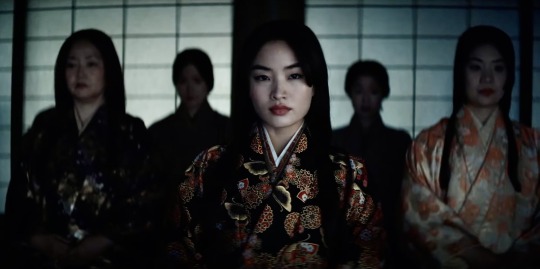
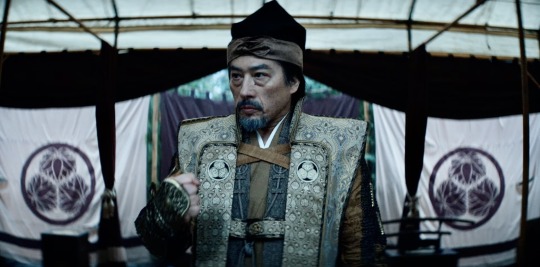

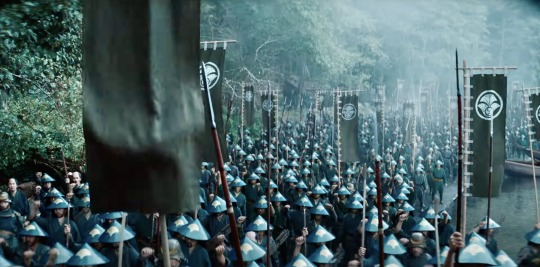

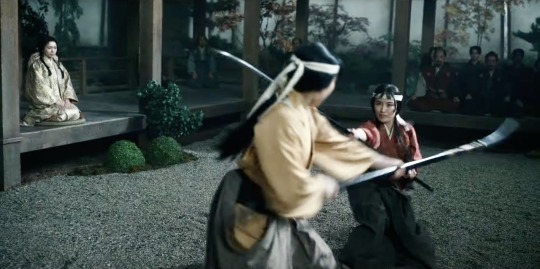
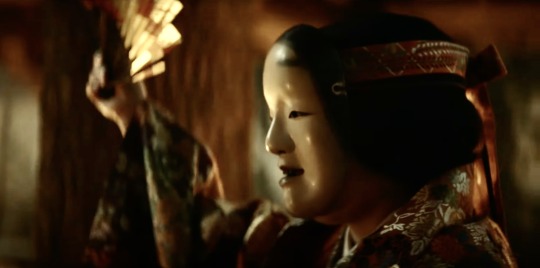
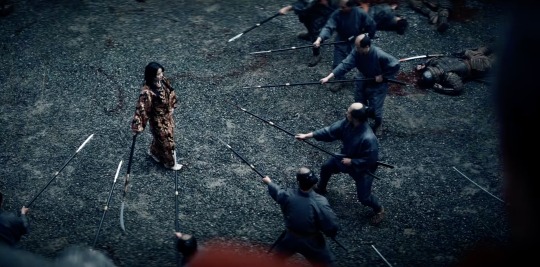

Shogun (2024)
Based on James Clavell’s novel, FX’s Shōgun is set in Japan in the year 1600 at the dawn of a century-defining civil war. Lord Yoshii Toranaga (Hiroyuki Sanada) is fighting for his life as his enemies on the Council of Regents unite against him.
Caught in between, is John Blackthorne (Cosmo Jarvis), an English sailor who finds himself marooned on the land of the rising sun. And how his fateful encounter with Lord Toranaga and Lady Mariko (Anna Sawai) would change his destiny.
youtube
While the characters are fictional, they are based on actual historical characters. Take for example, the three main leads:
Yoshi Toranaga is inspired by Tokugawa Ieyasu.
John Blackthorne is inspired by William Adams.
Toda Mariko is inspired by Hosokawa Gracia.
I enjoyed the 1980s film of the same name which is based on the same book and would very much look forward to watch this.
A tumultuous time where a rising Shogun attempts to unify Japan while Europe is at war between Catholics and Protestants.
#shogun#shogun 2024#shogun 1980#james clavell#hiroyuki sanada#cosmo jarvis#anna sawai#samurai film#samurai#feudal japan#tokugawa ieyasu#yoshi toranaga#john blackthorne#william adams#toda mariko#hosokawa gracia#Youtube
208 notes
·
View notes
Photo

155 notes
·
View notes
Text

“One and two and...”
WHACK!
There goes a chunk of watermelon flying across the room. Gracia that was too much force you used on that poor fruit. What was she up to with all this?
6 notes
·
View notes
Note
“ i don’t need to be understood. i just want to be accepted. ” (Avenger Gracia to Mitsuhide?)
⩤ The Meme ⩥
“That’s not possible...”
What Tama wanted was literally something that goes hand in hand. Understanding is a requisite of being accepted; and acceptance was the byproduct of having been understood. If what his daughter wanted was easy enough to comply with, people would have accepted him as shogun instead of a feeble 13-day rule. The people he thought were his allies-- and even a number of his actual allies abandoned or betrayed him in the end. No one tried to understand him, his motives-- and therefore, the acceptance couldn’t be ushered in.
“At least, that was what I wanted to say. However,” However, in this place, someone was too much of a simpleton to worry about the details. A heinous crime, treachery, murder, treason-- all of that hardly mattered. ‘So long as you are my servant...’ Words that he never imagined would stick in his mind echoed whenever doubt settles in. He didn't want to believe nor trust in those words, but when push comes to shove, that damned brat does follow through.

“So long as you are a servant here, someone stupid enough will accept you regardless.”
#⩤ Order Restored : Answered ⩥#soulsbetrayed#⩤ Hosokawa Gracia : Beloved ⩥#ic.#⩤ To each their own devices : Mitsuhide Akechi ⩥
0 notes
Text
One of my first (but hopefully not last) contributions to the emerging trivia on Shôgun:
Lady Ochiba / Ruri, the mother of the Taiko's heir Yaechiyo, is based on Lady Yodo/Chacha (1569-1615), niece to Oda Nobunaga and second spouse of Toyotomi Hideyoshi. We see her here as the primary moving force shoring up her son's position and the patron of Toranaga's rival Ishido.

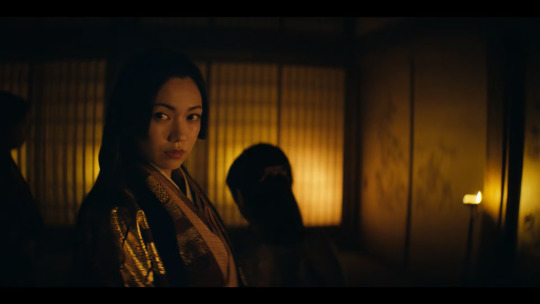
Fumi Nikaido as Lady Ochiba, Shôgun, 2024
What makes the casting of this one very interesting is that Fumi Nikaido has played the actual role of Yodo/Chacha in a similar period production, the 2014 NHK taiga drama Gunshi Kanbei (which was primarily about Kuroda Kanbei, the strategist of Hideyoshi played by Junichi Okada).
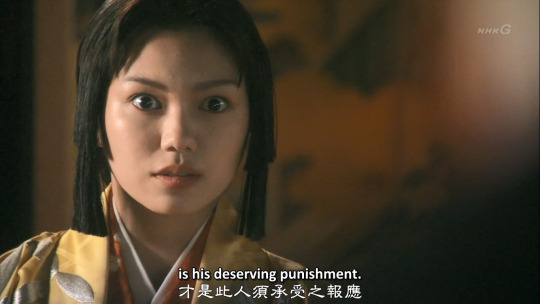

Fumi Nikaido as Yodo, Gunshi Kanbei, 2014
While there's enough hype for Toranaga (especially as he is portrayed by public favorite and producer Hiroyuki Sanada--rightfully so), I wish to highlight Fumi Nikaido's return to this role as it does help highlight the differences between how Lady Yodo is portrayed in fiction. (It does help that we have no shortage of it now--even if it's mostly in videogames like Samurai Warriors, Sengoku Basara or the more historically-faithful Nioh).
The material we have of Lady Ochiba so far is of a proud, haughty, even disrespectful woman--and perhaps it's not exactly far off from how Chacha is portrayed even in Japanese media. To some extent, even Gunshi Kanbei conceded to this especially in the episodes I'm referring with this photo--what with it precisely being the moment Yodo is fearing coming to pass. A mother seeking to protect her son's patrimony (and by extension, her agency and regency), it's a universal trope in feudal drama. What Shôgun does not give her yet (but Gunshi Kanbei took pains to establish) is the recognition that she is as much a victim of the warring era, turning her into a self-loathing monster only able to survive trying to make sense of it all, and maybe recover their agency in it. Clavell rightfully gave it to his main focus character, Lady Mariko (played very layered and well by Anna Sawai compared to her more recent outings--herself based on Hosokawa Gracia).
It truly amazes me that 10 years has yet to make much of a difference for Fumi Nikaido and this role. The woman whose position at the top was only made possible by misery and her playing by the cruel game of chaos, she portrays both versions with the edge, anxiety and palpable will of a woman who's lost everything before and is at the doorstep of losing them again.
#shôgun#shogun#samurai#shogun fx#shôgun fx#shôgun 2024#shogun 2024#fumi nikaido#chacha#lady yodo#yodo-dono#ochiba no kata#james clavell#lady ochiba
116 notes
·
View notes
Text
I mentioned this briefly over on MDL yesterday, but since I'm back from my theatre trip I figured I'd say a little something about the Shōgun finale here too.
I've seen quite the divide in how people felt about the ending; some hated it whilst others, myself included, loved it.
I think one of the things that some people feel disappointed by is the fact we never got to see the battle of Sekigahara that the show was building up to. Yet the truth is that Shōgun was never going to show it, because in terms of the story the viewer didn't need to see the battle to know the outcome.
The story was always about Toranaga and the journey he takes towards becoming Shōgun. He is a master strategist, and has been playing the game of war from the very start, just silently and through methods of politics rather than by the sword. He uses every person to his advantage, moving them like pieces on a board for his endgame, even those who he is closest to. Sure, there are moments he likely doesn't account for - the death of his son and the appearance of Blackthorne, for instance - but like any strategist of his level he either adapts them into his plans, or finds a way to use the moment in his advantage. That's what strategists do.
We don't need to see the battle of Sekigahara, because by the end of the show Toranaga has already won. This is what he tries to tell Yabushige before his death. Toranaga's explanation here reminds me to the moment he's talking to his son, with this quote:
'Why is it that only those who have never fought in battle are so eager to be in one?'
War is inevitable, but Toranaga is trying to minimize the number of those who have to die because of it. After all, his goal is for a peaceful era for Japan.
Mariko's death was the final act of Crimson Sky. Her death shakes the foundations enough to cause action to happen, because her death should not have been allowed to happen. Ishido knows this, which is why he sends his ronin to capture, not kill. Mariko's death, while tragic, is the final nail that sparks change. Ochiba, mourning the death of her childhood friend, decides to tell Toranaga in secret not to send the Heir's army to aid Ishido in battle, meaning that without his banner Ishido's war is no longer a lawful one.
While Mariko's death is a tragic one, it is not a meaningless one. It does not feel cheap, and the finale episode allows the viewers to mourn with those who knew and loved or respected her. I thought this was quite beautifully done, as even though she wasn't present in the episode, her spirit was still there, so she was still very much there. Some of the cinematography beautifully alluded to this, especially in moments like when Blackthorne and Fuji are sitting together in silence, yet there's one seat left -- Mariko's. Blackthorne even says then, 'no translator', because once Mariko had been a bridge of communication and understanding between them.
Another thing which I see a lot of confusion upon is Blackthrone's flash-forward scenes -- did he ever return to England? The answer, in my opinion, is told in the finale episode too. No, he didn't. Toranaga tells Yabushige that Blackthorne will never leave Japan, and in the scenes with an older Blackthorne, we see he's holding Mariko's cross. Yet he drops it into the water, showing that he lets it go. The episode title is 'a dream of a dream', and that's what Blackthorne's flash-forwards are: dreams. Another life, another path - but not this one.
The characters of Shōgun are based on real-life people in history -- it's actually really fascinating, and I've been learning more and more about their real-life counterparts whilst following this gem of a show. If you're interested in learning more, look up names like Tokugawa Ieyasu, Miura Anjin (William Adams) and Hosokawa Gracia (Akechi Tama).
All in all, Shōgun to me leaned more into the political intrique side of war, which for some people will be fascinating, and for others, not so much. But this show has so many layers and so much hidden within it, I can see it being one that's analysed for years to come.
#off topic chatter#shōgun#shōgun finale spoilers#i for one personally loved the series!#but then again i am the type of person who enjoys watching / listening / reading thrawn in star wars#and who spent an entire summer in college once binging the 80's version of legend of galactic heroes#so i've always been a big fan for strategists in media and more political scheming
18 notes
·
View notes
Note
Favorite movie of the 80s?
holy shit you're a real tumblr-type individual and not some weird bot situation HI I hope people are telling you about some cool movies. unfortunately I'm a Movies Idiot. everything I know about movies I learned from my wife. to find out what movies from the 80s I have even seen I had to go enter Really Stupid Search Terms into the internet and then also ask her. I have returned with 2 facts:
robocop and the lost boys came out in the same year apparently? big win for 1987
makai tenshō 魔界転生 samurai reincarnation was 81. that's my pick. that movie rocks.
from wikipedia:
Following the Shimabara Rebellion, Christian rebellion leader Amakusa Shiro is resurrected, and renounces his God for abandoning him and thousands of Christians to be massacred by the Tokugawa regime, swearing vengeance.
Gaining the power to resurrect the dead, he tempts, resurrects and recruits the betrayed samurai wife Hosokawa Gracia, unfulfilled legendary swordsman Miyamoto Musashi, and Buddhist monk Hozoin Inshun, who represses his sadistic desires, to join his cause as regret-filled demons.
And they wreck shop for like 2 entire hours and there's SO MUCH burning building at the end it OWNNNS SO HARD. MAKAI TENSHŌ.
#recently we found out my mom had not seen robocop so we made her watch robocop and that was also awesome#she's such a weirdo she has seen the same 15 oldass movies like a hundred times and told me a story about going to see#eraserhead with my dad's brother when it was in theaters her taste is so. something. anyway she got really emotionally invested#in robocop which was fantastic. halfway thru she was like 'if you're showing me a movie where the robocop dies I'm going to be so upset'#she said it like that. she said 'the robocop'. mom.... never change.
10 notes
·
View notes
Text
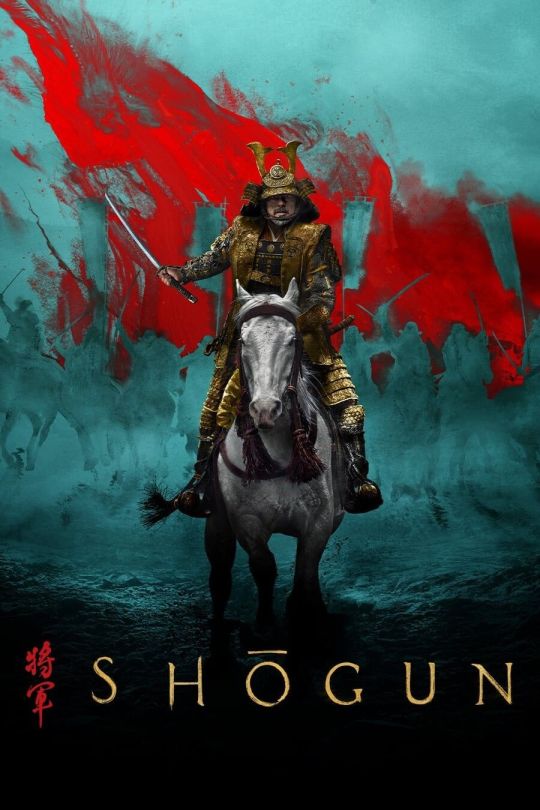
I promised that I’d talk about Shogun, so let’s talk about Shogun. I thought I’d already started writing this review, but I apparently didn’t, as I can’t locate the document, and I can’t even find my original handwritten notes….
For starters, it’s really good.
Based on James Clavell’s novel of the same name, the miniseries (at least, it was planned as a miniseries, but supposedly it’s gotten renewed) Shogun is about Japanese politics in the feudal period. In the year 1600, after the death of the Taiko, a council of five regents was put into power while the Taiko’s son grows up. One of those regents, Lord Toranaga, is accused by the others of wanting to make himself shogun, the de facto leader of Japan, and finds himself in a sticky situation where all of his opponents are trying to corner him.
Rather fortuitous, though, that a Dutch ship arrives on the coast of Japan, in one of Toranaga’s territories. On it is English government agent John Blackthorne, who arrives with the intent of disrupting Catholic Portuguese interest and trade in the country, and establishing Protestant influence. And that ship has a butt-ton of cannons that more than one faction would be happy to grab a hold of.
Feudal Japanese political intrigue: the miniseries!
One thing that’s fascinating about both the original novel and the miniseries is how this is essentially a fictionalization of real events. Yes, the cast is made up of fictional characters–but only barely. Just about every major character maps onto a real-life historical figure, which will help some viewers work out some things before they happen on-screen. Toranaga is a clear analogue to Tokugawa Ieyasu, and Blackthorne to William Adams (yes, the guy from Nioh), and Mariko to Hosokawa Gracia. Mind you, they’re very heavily fictionalized versions of those characters for the sake of drama. There’s no reason to think there was anything between Mariko and Blackthorne’s real-life counterparts.
If you’re curious, the TV Tropes character sheets for the show mention who each character was based off of.
I am concerned that many people are going to take this as a true representation of history, which, uh, it’s not. I keep thinking of people I know or on the Internet saying, “I know about Norse mythology, I’ve played God of War!” and, um, no. In Shogun, for instance, I think the writers (of both the show and the book, if I remember the novel correctly) lean too hard into the “Scheming Jesuit” stereotype than is probably accurate, because the idea of conniving Catholic missionaries, or Jesuits up to no good, is appealing to audiences today–although Father Alvito is a delightfully complex character.
This is not me saying that the show is bad because of these things! I’m just saying don’t take it as history.
[Although! If we look at this with a critical lens, part of why the Catholics in Japan are so seemingly hostile is because our main European viewpoint character is Blackthorne–who they rightly suspect to be an enemy agent. Blackthorne even makes a comment at the end of the series that throws into question everything he’s said about the Catholic Plots.]
A thing that newcomers should be aware of: this is not an action series. If you come into this story because you wanted to watch a bunch of samurai battles, welp, this is not for you. There is violence, certainly, and occasionally it is done with swords, and it is generally brutal when it occurs; however, there aren’t epic battles and duels every episode. Most of the show is about political maneuvering, with bits of violence, sometimes perpetrated against the self, in order to get different people in places where they’ll be advantageous or disadvantageous to our protagonists.
To make that work, there is so much impressive character work in the story. These actors are giving it their all to make these characters come to life, and act in ways that move the story forward while also remaining consistent. Because this is set in a society that has such restrictive social rules, a lot of what characters say isn’t as relevant as how they say it, and so I think careful viewers will be rewarded.
I should probably make a note about language: most of this show is in Japanese. There are parts that are in English (which in-universe is meant to signify Portuguese, the European language in Japan, which Blackthorne also speaks). You’re going to read a lot of subtitles while watching the series, unless you happen to speak Japanese. Apparently there were concerns that viewers wouldn’t like this, though considering the show’s success, those fears seem unwarranted. Supposedly, the dialogue is written in old-fashioned Japanese, though having no knowledge of the language I couldn’t really say.
Shogun has been compared to Game of Thrones, because that’s where we are as a culture, I guess–large fantasy/historical dramas that feature political maneuvering, violence, and sex are measured against the HBO show. I have seen a grand total of maybe four episodes of Game of Thrones, so I’m not qualified to judge the comparison entirely; still, I think given that it isn’t a fantasy setting, the story is based entirely on Japanese history, and there isn’t a war going on, that Shogun is a different show entirely, and also that we need to stop comparing everything remotely similar to Game of Thrones.
It is not a casual show to watch–it’s intense, there is violence, there is sex (though the show lingers on it less than some of its rival programs), and there is so much suspense in how things will play out. If you can accept that, though, Shogun is a rewarding experience with memorable, interesting characters, and an entire story contained within a season with near perfect pacing.
It’s a really good show.
Mind you, I’m not sure they can keep up the momentum for another two seasons…
3 notes
·
View notes
Text

Happy International Women's Day to Hosokawa Gracia, I think she should've been allowed to continue doing whatever she wanted
1 note
·
View note
Text
I really enjoyed this week's Shogun episode, especially its focus on female characters, their backstory, familial ties, ambitions and role in the political game of the series. Big fan of Ochiba-no-Kata (historical Yodo-Dono/Chacha) as a character and her childhood friends-to-political rival camps dynamic with Mariko (historical Hosokawa Gracia). Speaking of whom, i'm always a sucker for The Yearning and here that one hand graze...
Also between that series and Blue Eye Samurai and their diff sex and sex-work coverage I actually want to read some solid academic work on actual norms and attitudes towards sex and sex work in 17th cent Japan (if anyone on here happens to know then please rec)
1 note
·
View note
Text

Statue of Hosokawa Gracia at Miyazu Catholic Church, Kyoto Prefecture by Discover Kyoto
The daughter of Akechi Mitsuhide and the historical character that inspires the character of Toda Mariko in James Clavell's Shogun.
#hosokawa gracia#miyazu catholic church#kyoto prefecture#japan#akechi mitsuhide#james clavell#shogun#toda mariko
10 notes
·
View notes
Photo
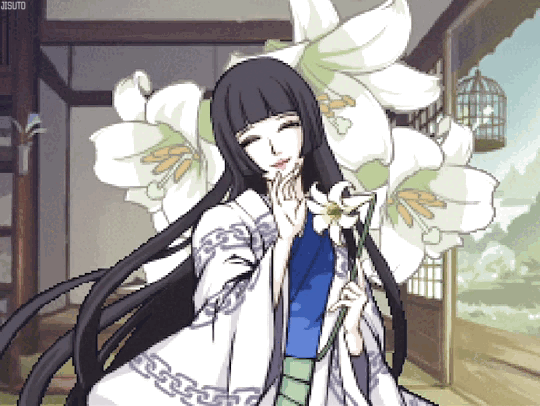
59 notes
·
View notes
Text
6月15日 - Kyoto Imperial Palace | Kyoto National Museum
I wanted to compare my experience visiting the current Imperial Palace and Tokyo National Museum with the old capital's museum and palace. Today I really focused on observing such differences and how Kyoto inspired the current modern-day buzzing metropolis capital of Tokyo through our excursions.
•••
Kyoto National Museum 🏛️



Our first stop of the day was the Kyoto National Museum. The museum did not allow pictures or phones out inside the exhibits, nor minimal to no talking. The museum's temperature was also warm, which could be attributed to preserving the pieces displayed as some were as old as the 13th century!! The gallery's simple dark interior allowed for each exhibited work to shine and capture the viewer's attention. Multiple pieces stood out to me. From the double-edged black sword and giant guardian sculptures at the beginning of the exhibit to even the intricately drawn long scrolls with artwork of outside nature, each piece was uniquely made, and many captured my attention. However, the piece that intrigued me the most was the artwork of Hosokawa Gracia praying.
Hosokawa Gracia 🖼️

Due to the history of Japan banning Christianity, finding an art piece portraying a noble indulging in Christian practices in the time period right before the formation of the Tokugawa Shogunate was intriguing nonetheless. All in all, it was really fascinating to see such an art style portray Christian visuals just in the manner in which it fascinated me to see oil paintings from the Tokyo National Museum of Japanese women in kimonos. Its rarity exemplifies even more beauty in my eyes.
Nishiki Warai 🥢


After the museum, we broke for lunch at the station before our journey to the imperial palace. A couple of classmates and I ate at this restaurant called Nishiki Warai. The service was fast and efficient, with our waiter taking our order before we even got seated. I had this pork okonomiyaki which was really filling and absolutely delicious. However, I did burn my tongue on the food, but it was worth it.
Kyoto Imperial Palace 🏯

We made our way to the old imperial palace to get an English tour of the royal grounds. The court had been burned so many times throughout history that most of what we saw was replicated, not the palace's original part. One thing I really enjoyed was being able to see pictures of what potentially the mirror, sword, and jewel looked like that the emperor possesses. Visiting the site where a lot of ancient Japanese history took place was fascinating. I liked the simplicity of the construction and yet the large and extensive size of its dimension in volume.
•••
While I did prefer the Tokyo counterparts to Kyoto, one must recognize both the beauty and great historical significance of the old imperial palace and National Museum. Both sides really aided me in possessing a deeper understanding of the history and modernization of Japan from the pre-Tokugawa period all the way to 2023. The initiative taken to preserve Japan's extensive history truly amazes me, especially as an American.
📚 Academic Reflection 📚
The reading is on the background of the Tale of Genji, how it relates to the palace in the old capital of Kyoto, and how the city streets were set up leading up to the Imperial Palace influenced by the Chinese capital. This relates to today's excursion through our visit to the imperial palace as it relates to the descriptions described in the text.
0 notes
Text
“The festivities grow everyday. Shall we make it one to remember?”

2 notes
·
View notes
Text
Revamped Tags
So I remade my long-ass list of tags. They are under the cut because long. Anyway, I'm also going to remake my current shipping tags because I think they need to be revamped as well. So if you want a ship tag with Kiomi or any of the muses of this blog, feel free to like this post. Only requirement is that our muses have interacted.
=== Mun Tags ===
Beyond the Bounded Field || OOC
Craft Essence || Commissioned Piece
Limelight || Commission
Drawing Board || My Art
=== General Purpose Tags ===
⩤ Throne of Heroes ⩥ Gallery
⩤ Unprompted ⩥
⩤ Starter ⩥
⩤ The Meme ⩥
⩤ HQ Report : Dash Comm ⩥
⩤ Simulation Room : Dash Games ⩥
⩤ The Grind : Memes and Games ⩥
⩤ Order Restored : Answered ⩥
⩤ Dailies : Anon ⩥
⩤ Attention : PSA ⩥
⩤ Mystic eyes of .Crack. Perception ⩥
⩤ tw : ⩥
⩤ Inbox Call ⩥
⩤ Preparing to Rayshift : Queue ⩥
⩤ Take my Hand : Wishlist ⩥
⩤ Drums of War : Music ⩥
⩤ War Council : P . R . O . M . O. ⩥
⩤ Loyalties : P.r.o.m.o ⩥
⩤ Stashed ⩥
⩥ Cont'd from x
=== Muse Tags ===
⩤ Blog Shenanigans ⩥
⩤ Muse Commentaries ⩥
⩤ Visage ⩥
⩤ Saint Graph : Headcanons ⩥
⩤ Battle Records : Aesthetics ⩥
⩤ To each their own reveries : Musings ⩥
⩤ Chaldea Lunchtime : Conversations ⩥
⩤ Interlude : Drabbles ⩥
⩤ To each their own devices : Kiomi ⩥
⩤ To each their own devices : Kamo Serizawa ⩥
⩤ To each their own devices : Mitsuhide Akechi ⩥
⩤ To each their own devices : Takechi Zuizan ⩥
⩤ To each their own devices : Tanaka Shinbei ⩥
⩤ To each their own devices : Chen Gong ⩥
⩤ To each their own devices : Okuni ⩥
⩤ To each their own devices : Lanlan Fang ⩥
⩤ To each their own devices : Major Magatsu ⩥
⩤ To each their own devices : Major Reiter ⩥
⩤ Echoes : Guest Muse ⩥
=== Verse Tags ===
⩤ Singularities : Main ⩥
⩤ Remnants : AU ⩥
⩤ Event Horizon : Crossovers ⩥
=== Friend Tags (Ever growing) ===
Arai-chan
⩤ Sarutobi Arai : Sister-in-Arms ⩥
Assortedsnacks
⩤ Touken Danshi : Kikkou Sadamune ⩥
Aurivore
⩤ Gilgamesh : Majesty Defined ⩥
⩤ Kogil : Decadent Exuberance ⩥
Caemthe
⩤ Demon King of the Sixth Heaven : Oda Nobunaga ⩥
Gemsofchaldea
⩤ Jack : A Child Beloved ⩥
⩤ Da Vinci-Chan : The Universal Beauty ⩥
Getsuruito
⩤ Momochi Tanba : The Great Ninja Master ⩥
⩤ Pang Tong : The Fledgling Phoenix ⩥
Historias-Multorum
⩤ Hinata Hyuuga : Delicate Breeze ⩥
⩤ Tsunade : Densetsu no Hime ⩥
⩤ Izuna ⩥
⩤ Shizune ⩥
Homeport
⩤ Sakamoto Ryouma : The Miracle Worker ⩥
⩤ The Evil Mastermind : Takasugi Shinsaku ⩥
⩤ Hizen Tadahiro : The Sharpest Edge ⩥
Kiicho
⩤ Kicho : Enchanting Pearl of Mino ⩥
⩤ Nohime : Ties Severed ⩥ (Mitsuhide)
Lovedloyalty
⩤ A Saber Among Shadows : Okada Izo ⩥
⩤ Alter Ego : Okada Izo ⩥
⩤ Mori Nagayoshi : Blood Soaked Loyalty ⩥
⩤ Beowulf : The Grendel Buster ⩥
⩤ Leonidas : The King of Sparta ⩥
⩤ Phantom : Angel of Music ⩥
⩤ Shuichi : Spiral Bound ⩥
⩤ Mephistopheles : Deals with the Devil ⩥
⩤ Hitokiri Izo : Hound of the Kinnoto ⩥ (Tosa)
⩤ Okada Izo : The Ghost of Tosa ⩥ (Redline)
⩤ Mori Nagayoshi : Demon of the Battlefield ⩥ (Blog Servants, Redline)
⩤ Old Man Li : Old and Strong ⩥ (Blog Servants, Redline)
Moonlightmagus
⩤ Yuuki : Friends Forever ⩥
⩤ Na'amah : A Demon Dancing through Emotions ⩥
Mysticallities
⩤ Tristan : A vicious fairy knight ⩥
⩤ Strange Amalgamation : Rintsuka ⩥
⩤ Liber : The Ancient Arbitrator ⩥
Nobuverse
⩤ Chacha : A Radiance of Warmth ⩥
⩤ Nobunaga Oda : The Avenging Fool of Owari ⩥
⩤ Summer Nobunaga : Blazing Rockstar! ⩥
⩤ Nagao Kagetora : The Dragon of Echigo ⩥
⩤ Lancer Class : Mei Fan ⩥
⩤ Nobunaga Oda : Enemy at Honnouji ⩥ (Mitsuhide)
Nulltune
⩤ Hakuno : Shards of Moonlight ⩥
Madamhatter
⩤ Sophie : A Dutiful Heart ⩥
Soulsbetrayed
⩤ Avenger Class : Izou the Manslayer ⩥
⩤ Touken Danshi : Tensho Koshirae ⩥
⩤ Hosokawa Gracia : Beloved ⩥
Spookums
⩤ Witching Hour : Gabriella ⩥
Summoned-Anima
⩤ Ashiya Douman : The Humble Priest? ⩥
Super-Kame-Love
⩤ Aina Kichida : The Turtle Sage ⩥
Tenkoseiensei
⩤ Assassin Class : Yan Qing the Wingman ⩥
2 notes
·
View notes
Text
Danganronpa:Ransei's Tears
read it on the AO3 at https://ift.tt/eh0H1nG
by Spinnetossa_Shipper
After the great Ransei War, it is believed that peace has returned to the region. However, as the 38 Warlords and Junior Warlords suddenly vanish without a trace, peace seems unlikely. Waking up in an unknown environment, these warlords must now fight for their survival. What will it take for these closely bonded warriors to kill once more?...
(This is more of a Pokemon Conquest centric fanfic so you do not need to be a Danganronpa fan to understand this story)
(First Chapter is an authors note and not part of the story)
Words: 187, Chapters: 1/?, Language: English
Fandoms: Dangan Ronpa Series, Pokemon + Nobunaga no Yabou | Pokemon Conquest
Rating: Teen And Up Audiences
Warnings: Graphic Depictions Of Violence, Major Character Death
Categories: Multi
Characters: Shujinkou | Hero (Pokemon), Shujinkou | Heroine (Pokemon), Oda Oichi, Maeda Keiji, Fukushima Masanori, Ishida Mitsunari, Katou Kiyomasa, Toyotomi Hideyoshi, Kuroda Kanbei, Takenaka Hanbei, Mouri Motonari, Chousokabe Motochika, Tachibana Ginchiyo, Tachibana Muneshige, Imagawa Yoshimoto, Shimazu Yoshihiro, Uesugi Kenshin, Naoe Kanetsugu, Aya Gozen, Takeda Shingen, Sanada Yukimura, Kunoichi (Samurai Warriors), Houjou Ujiyasu, Narita Kaihime, Fuuma Kotarou, Nene | Toyotomi Yoshiko, Hattori Hanzou, Date Masamune, Saika Magoichi, Tokugawa Ieyasu, Honda Tadakatsu, Komatsuhime | Honda Inahime, Saitou Nouhime, Izumo no Okuni, Akechi Mitsuhide, Hosokawa Gracia, Mori Ranmaru (Historical RPF), Oda Nobunaga
Additional Tags: Crossover, Killing Game (Dangan Ronpa), Character Death, Original Character(s)
read it on the AO3 at https://ift.tt/eh0H1nG
0 notes